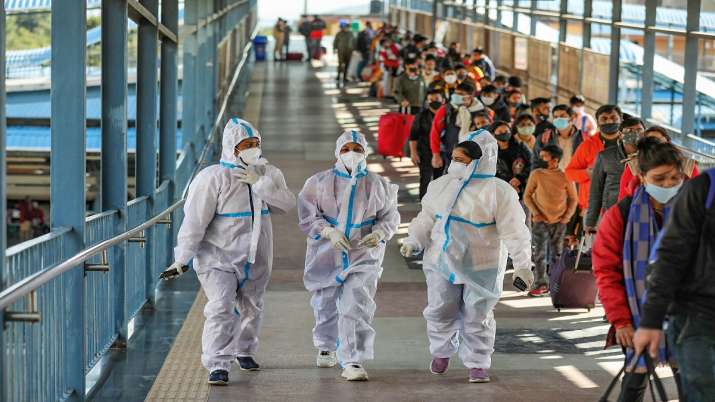
Omicron: Evidence suggests it lowers immunity to earlier infections than other types
Scientists are working round the clock to get a better understanding of the Omicron version. Around the world, countries have imposed travel restrictions to reduce the spread. South African scientists first announced that they had identified a new variant on November 25, 2021. Since then, COVID cases have risen sharply and South Africa has entered the fourth wave.
Scientists from the South African DSI-NRF Center of Excellence in Epidemiological Modeling and Analysis and the National Institute for Communicable Diseases) spoke to The Conversation Africa about their findings, which are set out in a pre-print paper.
How is Omicron different from the previous variants?
Our major findings center around the risk of re-infection. Re-infection is defined as a positive SARS-COV-2 test more than three months after the last positive test. We found that the relative risk of reinfection was much higher (at least 3-fold) with the Omicron variants compared to the beta and delta variants. Our evidence suggests that the Omicron variant is associated with an increased ability to evade immunity from prior infection. In contrast, there is no population-wide epidemiological evidence of increased immunity associated with beta or delta variants compared to the native, or wild, type. This finding has important implications for public health planning, especially in countries such as South Africa with high rates of immunity from prior infections. A study to measure past infections found that almost half of blood donors in South Africa had already been infected just before the third wave (in May 2021). Another study, called PIRST-C, followed families over time, finding that more than 60% of individuals had been infected by the end of August 2021. As a result of this high level of prior infection, a small fourth wave was expected among adults, combined with about 40% coverage of vaccination.
But, if the virus mutates to enhance its ability to evade natural immunity – as it appears to have happened with Omicron – governments will rely on prior natural immunity to estimate the size of future outbreaks. Can’t trust. At this stage, we cannot say anything about the severity of cases of Omicron – either in primary or in re-infection. We also do not have information on vaccination status for re-infections.
Another major issue that remains to be answered is whether reduced immunity to re-infection will affect the prevention of serious illness and death. Several pre-prints have now surfaced suggesting that Omicron may prevent neutralization in vaccinated people who have not had the infection before. These findings may help explain the greater risk of reinfection. On the other hand, preliminary laboratory results for measuring T-cell-based immunity suggest that adequate protection against severe disease and death may remain. Our findings were based on an analysis of surveillance data collected in South Africa between 04 March 2020 and 27 November 2021.
What do your findings say about vaccine efficacy?
Based on the data used in this study, we cannot say anything about its effects. We expect that vaccines against serious disease with Omicron will have a similar effect compared to other types.
What can individuals do to reduce the effects of the fourth wave?
Even with the new version, the major preventive measures that individuals can take are wearing masks, social distancing, improving ventilation and getting vaccinated. During the holiday season, it is important to avoid large crowds, especially indoors. Until we have a better understanding of this version, it’s best not to gather with a group of friends, but if you do, please exclude it.
Read also Delhi reports second Omicron case, Zimbabwean passenger tests positive
,